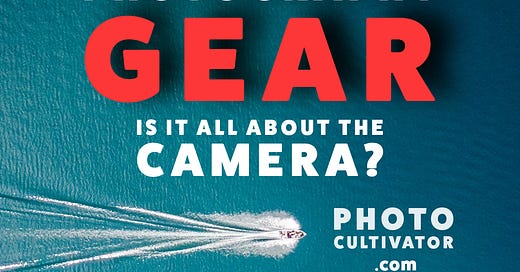Photography Gear: Is It All About the Camera?
The role of gear in capturing the perfect shot is key.
But do you really need the latest, greatest camera to take amazing pictures?
Here are the secrets to becoming a great photographer.
The Gear Dilemma
As aspiring photographers, we've all been there.
You want to get started on your photographic journey, and you can't help but wonder, "Do I need the latest, greatest camera to take amazing pictures?".
It's a valid question.
And it sparks a passionate debate among photographers of all levels.
On one side, there's the camp that believes gear isn't everything.
They argue that in today's world, smartphones are more than capable of capturing amazing images.
These devices are always within arm's reach, and with the right knowledge and apps, they can rival dedicated cameras in many situations.
The opposing viewpoint says that having the right camera and equipment can make a world of difference.
A dedicated DSLR or mirrorless camera offers advanced control over settings, superior image quality, and the versatility to tackle various photography styles and scenarios.
So, which perspective holds more weight?
Let's break it down.
The Smartphone Revolution
Smartphones have become part of our lives, and today they allow anyone to take pictures.
Whether you're using an iPhone, Android, or any other brand, modern smartphones have impressive camera tech.
They can capture sharp, vibrant images without any knowledge of photography.
But here's the thing: the magic is in the software as much as the hardware.
Smartphone apps allow you to fine-tune settings like exposure, focus, and even manual controls, making it possible to explore the exposure triangle and take beautiful and creative shots.
The smartphone revolution gave photographers the power to experiment, learn, and capture moments without the need for expensive gear.
Beyond the Gear: Skills Matter
Now, let's pivot to the other side of the debate.
Yes, smartphones are fantastic tools, but they can't replace the depth of knowledge and skill that comes with using a dedicated camera.
Here's why:
Full Creative Control
DSLRs and mirrorless cameras offer complete control over settings like aperture, shutter speed, and ISO. This control is critical to creating specific effects, like silky waterfalls or dreamy background blur.
Image Quality
Smartphones can produce impressive photos. However, larger camera sensors and high-quality lenses result in superior image quality, especially in challenging lighting conditions.
Versatility:
Dedicated cameras can adapt to many different photography styles, from portraits to landscapes to action shots. You're not limited by the fixed focal length of your smartphone lens.
Learning Experience
Learning to use a DSLR or mirrorless camera is a journey in itself. Understanding exposure, composition, and other techniques of photography becomes more accessible when you have a tool designed for it.
The Middle Ground
So, what's the verdict?
Is it all about the camera, or is gear secondary to skills and creativity?
The truth, as often is the case, is somewhere in the middle.
It's not about whether one camp is right and the other is wrong.
Instead, it's about finding the balance that best adapts to your needs and your photographic journey.
And it’s unique to everyone.
Beginners: Education Matters
If you're just starting in photography, the most valuable investment you can make is in your own education.
Books, online courses, and tutorials can teach you the fundamentals of photography, regardless of the camera you use.
Understanding composition, lighting, and the exposure triangle are a must.
Smartphone photography is accessible and convenient.
But you should still experiment with dedicated cameras as you progress.
They offer a depth of learning and creativity that can boost your skills.
Choosing the Right Gear
For those who are ready to take the plunge with dedicated cameras, the key is finding the right balance between your needs and your budget.
You don't need the latest and greatest camera to create fantastic images.
Consider a bit older models or somehow used gear that offers excellent value for your money.
Ultimately, your choice of camera should align with your photography style and preferences.
If you like some specific types of photography, like wildlife or sports, your gear will make all the difference.
GAS: Gear Acquisition Syndrome
One pitfall to avoid is falling into the "Gear Acquisition Syndrome" (GAS) trap.
GAS is the tendency to continually upgrade your equipment in pursuit of the latest and greatest.
Upgrading can be justified when your skills grow.
But you don’t need to invest more if you don’t make any progress.
And that’s it
In the great photography gear debate, there's no one-size-fits-all answer.
The camera you use, be it a smartphone or a DSLR, is only a tool.
What matters is your passion for photography. Your willingness to learn, and your creative vision.
So, the next time you're tempted by a new camera gear, pause for a moment.
Ask yourself if what you have is not enough already. You just might need to level up your skills first.
The best camera is the one you like.
The one that best fits your style.
The one that inspires you to capture the world around you.
In the end, it's not about the gear.
It's about the stories you tell through your images and the joy you find in photography.
I hope that helps,
Hakan.
p.s. if you enjoyed my newsletter, the best favor you could do for me is to give it a shout-out and say a few nice words online. Thank you!



